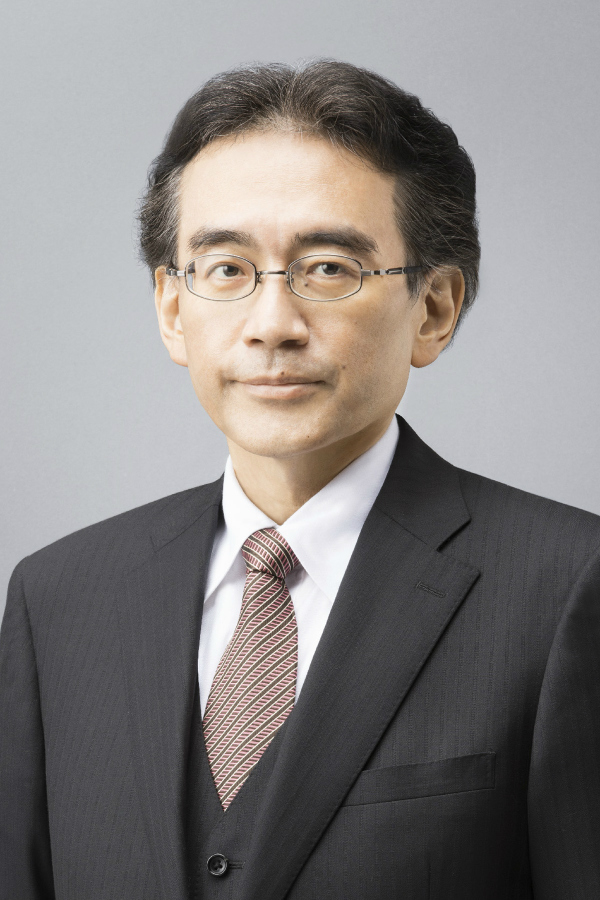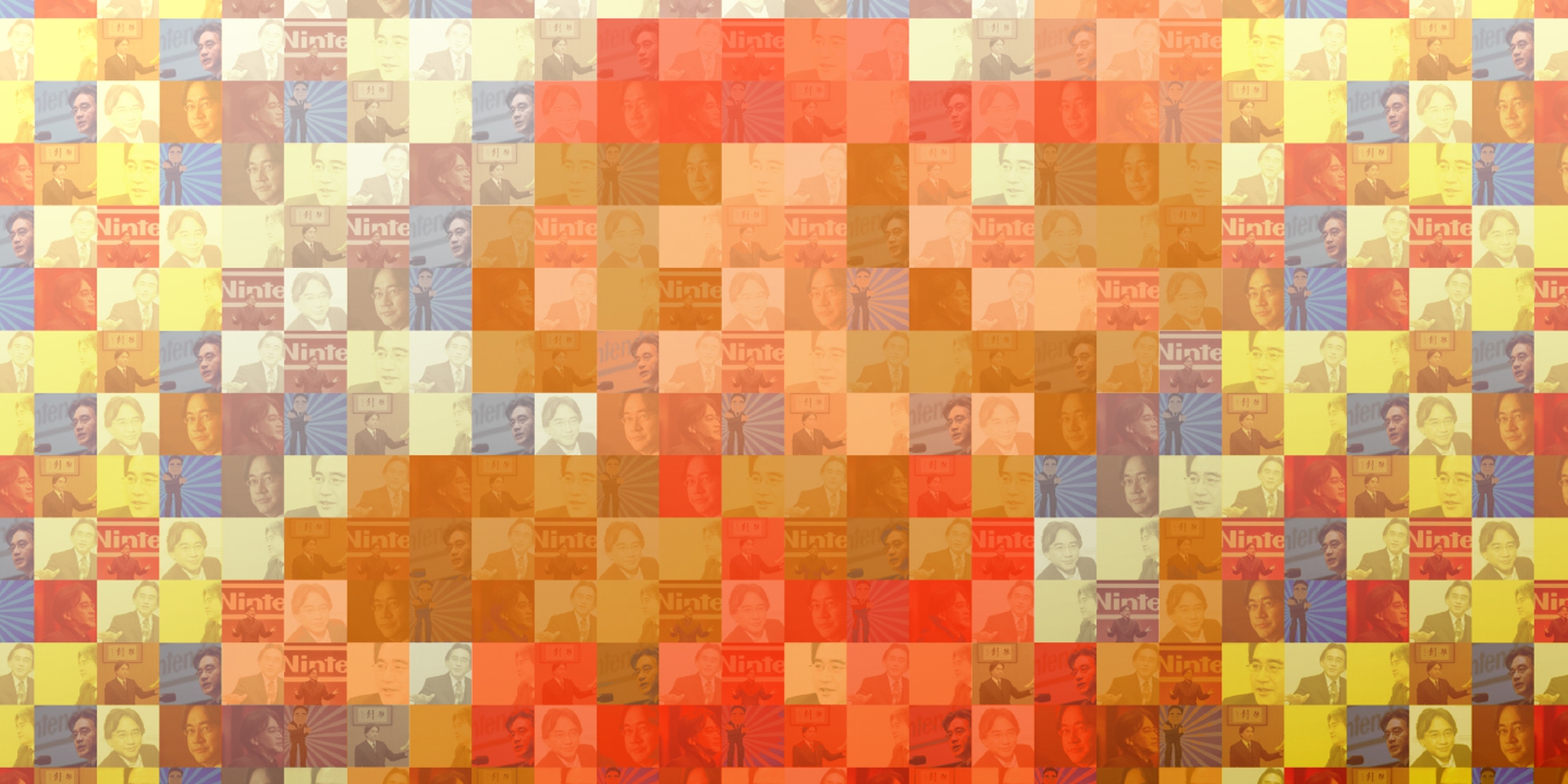It's clear from the outpouring of sadness over Satoru Iwata's death that he was more than just a name at the top of Nintendo's corporate ladder. He was a developer and game enthusiast at heart, and personally helped lead us into an age where everyone is a gamer.
When you saw someone taking hold of a Wii Remote and learn how to love video games for the first time, you saw the spirit of Iwata. When you see dozens of people are immersed in Nintendo DS handheld systems everywhere you go, you see Iwata's legacy.
To look at the video game industry as nothing more than a collection of games to be sold is an understandable point of view. But the truth is that underneath the glitzy marketing and corporate strategies there is a culture of vibrant and creative personalities—the people who really define the innovation and importance of video games.
No matter how high he climbed in the Nintendo leadership, Iwata always remained one of those people. Here we remember some of the many defining points of his legacy.
1) Iwata was a gamer before he was anything else.
In what has become a legendary speech in the video game world, Iwata laid bare his identity and his priorities in his Game Developers Conference 2005 keynote address.
"On my business card, I am a corporate president. In my mind, I am a game developer. But in my heart, I am a gamer."
This philosophy informed everything Iwata accomplished during his tenure as president of Nintendo. His desire to serve the audience was born of much more than a need to post positive financial results for his shareholders.
2) Iwata was always willing to get his hands dirty with the other developers.
There an anecdote that folks in the gaming community like to pass around about how Iwata helped fix Balloon Trip Freeze, one of the mini-games included in Nintendo Land, before it was released in 2012 for the Wii U.
Early in his career, Iwata worked as a programmer on Balloon Fight for the Nintendo Entertainment System when he was employed at HAL Laboratory, a game development studio with historically close ties to Nintendo. As the story goes, Iwata saw something wrong with Balloon Trip Freeze, the Nintendo Land tribute to his old game, and made sure the programmers got it right by jumping into the code to make fixes himself.
There is a more on-the-record demonstration of how Iwata never lost touch with his identity as a game developer from an interview with the Japanese outlet 4Gamer.net (translated by Nintendo Everything).
Super Smash Bros. for the Nintendo 64 was developed at HAL Laboratory while Iwata was still a programmer at the company.
In 2000, Iwata joined Nintendo as the general manager of the corporate planning division—a "suit" job if there ever was one. When Super Smash Bros. Melee for the Nintendo GameCube was in danger of not being ready in time for release, Iwata briefly tossed aside his new corporate identity to jump back into the trenches.
Iwata: Aaah, I wonder if it’s alright to admit this? Well, I guess the proverbial statute of limitations is up, so I’ll tell you, but my actual last work on programming happened when I was working as the General Manager of Corporate Planning at Nintendo. Something happened and the Gamecube version of Super Smash Brothers didn’t look like it was going to make its release date so I sort of did a code review for it (Wry Laugh).All: (Laugh Loudly)Kawakami: No matter how you look at it, that’s not the job of the General Manager of Corporate Planning, is it? (Laughs)Iwata: Yes, it isn’t really, is it (wry laugh). At the time, I went to HAL Labs in Yamanashi and was the acting head of debugging. So, I did the code review, fixed some bugs, read the code and fixed more bugs, read the long bug report from Nintendo, figured out where the problem was and got people to fix those…all in all I spent about three weeks like that. And, because of that, the game made it out on time.Kawakami:So you even did the debugging yourself!Iwata: And that was the last time that I worked as an engineer ‘in the field’. I was right there, sitting by programmers, in the trenches, reading code together, finding the bugs, and fixing them together.
3) Iwata broke down cultural barriers.
Speaking to CNN in 2011, Iwata attempted to explain what motivated the design of new console hardware at Nintendo under his leadership.
Many people in this industry tend to categorize our customers into two groups -- one is the core gamer and the other is casual gamers.
They somehow say that these two groups will never mix or overlap. They even say that you are born to be a casual gamer or you are born to be an avid gamer. But of course, needless to say, nobody is born an avid gamer.
The heart of the matter is that everybody starts video games as a beginner. Then, after going through a lot of experiences and becoming more and more fond of video games, they become the experts.
If we maintain that kind of wall or psychological barrier separating the two groups, someday I'm afraid that the culture of video games will be diminished.
We want to create a kind of cycle where casual gamers are gradually growing up to become passionate players. In order to maintain that kind of cycle, we needed to break down the wall.
The Nintendo Wii removed console gaming from the exclusive province of the control pad, and opened the console world up to people who needed to know nothing more than how to wave a wand.
"With the Wii remote, the learning curve for most games is 15 minutes or less," said Michael Pachter, one of the video game industy's most well known financial analysts and a game culture personality in his own right, told Bloomberg Business in 2006, the year the Nintendo Wii was released. "I think that will eliminate the intimidation factor and will attract a broader audience."
Nintendo games have long enjoyed a reputation for being family friendly. To Iwata, that did not make Nintendo games any less mature than their counterparts on PlayStation and Xbox. It made Nintendo games more concerned with how many people could learn to play them.
“Some people will say Nintendo’s games are for children,” said Iwata, as reported by Bloomberg Business in the run up to the release of the Wii. “But our goal is to boost the population of gamers by making games for all ages.”

Nintendo
4) Iwata sent Nintendo sailing on a Blue Ocean of fresh ideas.
Blue Ocean strategy in corporate-speak is the deliberate intention of not working in established modes of thinking—not sailing the oceans that are red with the blood of corporate combat. Blue Ocean thinking is about taking risks and innovating, rather than doing what everyone else is doing.
The Wii is an obvious demonstration of Blue Ocean thinking at work. The Wii sold more than 100 million consoles over its life cycle, besting both the PlayStation 3 and Xbox 360 in the seventh generation console war. In the judgement of history the Wii will likely loom just as large as the original Nintendo Entertainment System that put Nintendo in the world's spotlight as a leader in game development.
The Nintendo DS handheld was also a product of Blue Ocean thinking. Today, the DS line of handhelds is so dominant that it took a bona fide technological revolution, the popularization of smartphones and tablets, to challenge Nintendo's position in the handheld gaming market.
When the original DS was announced, however? Pundits thought Nintendo was out of its mind. The touchscreen technology incorporated into the bottom half of the DS was something entirely new. Iwata knew how to challenge paradigms, and in doing so he set them instead.
Sony and Microsoft both attempted to put their own stamp on motion control gaming with the PlayStation Move and Kinect peripherals respectively, and neither company managed to get it as right as Nintendo did. Nintendo may have finally met a challenge in the handheld gaming world, but the glasses-free 3D technology of the Nintendo 3DS line has to-date gone unparalleled in gaming.
The upcoming Nintendo DX console is likely to be a similar technological evolution, blending the worlds of home consoles, handheld gaming platforms, and the mobile gaming world. Nintendo will continue to sail the Blue Ocean on the course that Iwata set.
5) Iwata is why you can play your old Nintendo games on current Nintendo consoles.
One of Nintendo’s hallmarks is the Virtual Console, by which you can play games from the Nintendo Entertainment System, Super Nintendo Entertainment System, and Nintendo 64 on the Wii, and by extension the Wii U.
If you’re willing to put the time and money into finding legacy console hardware and software, you can relive your experiences with old school Nintendo games. Otherwise, games like the original Legend of Zelda and Super Mario Bros. become nothing but memories.
This was not acceptable to Iwata. The mandate that the Nintendo Wii be able to play Nintendo games that were two decades old came directly from Iwata. The Virtual Console is his baby.
In remembrance of Mr. Satoru Iwata, Nintendo will not be posting on our social media channels today. pic.twitter.com/N2kR0OKEXh
— Nintendo of America (@NintendoAmerica) July 13, 2015
6) Iwata took multiple self-imposed pay cuts when profits were down.
Nintendo is currently riding high on the success of amiibo figures, the announcement of a partnership with Japanese mobile game giant DeNA, and plans for a console that began development under Iwata’s leadership code-named NX.
For the past several years, however, even with substantial cash reserves to keep the company strong Nintendo posted losses, something that historically has not been the case. Iwata made sure that he, personally, drew less upon those cash reserves that kept Nintendo strong.
Iwata never made much money to begin with compared to other corporate leaders. In 2010, GamesIndustry.biz reported Iwata’s annual salary at $770,000, that could increase with performance-based bonuses up to $2.11M.
In 2011, following a weak launch of the Nintendo 3DS that necessitated a rapid price cut, Iwata cut his salary in half. In 2014, following weak market performance of the Wii U, Iwata cut his salary in half, again.
7) Iwata refused to fire Nintendo employees in the face of difficult times.
As the president of a publicly traded company, Iwata was responsible for appearing and answering questions at annual shareholders’ meetings. At the 73rd Annual General Meeting of Shareholders, Iwata was asked why he hadn’t carried out corporate restructuring, if operating costs were the reason the company was not profitable.
After explaining how the valuation of the Japanese Yen versus the U.S. dollar played a role in the financials, Iwata explained why he would not cut down on the number of employees at the company.
“If we reduce the number of employees for better short-term financial results,” said Iwata, “employee morale will decrease, and I sincerely doubt employees who fear that they may be laid off will be able to develop software titles that could impress people around the world. “
“I also know that some employers publicize their restructuring plan to improve their financial performance by letting a number of their employees go,” said Iwata, “but at Nintendo, employees make valuable contributions in their respective fields, so I believe that laying off a group of employees will not help to strengthen Nintendo’s business in the long run.”
8) Iwata knew how to have genuine conversations with fellow creatives.
Among Iwata's lasting contributions to the history of Nintendo is the Iwata Asks video series, where he interviewed developers about their creations in personable and informal conversations. Iwata spoke their language and that made possible genuine dialogues.
Here in 2010 Iwata and Shigeru Miyamoto talk about the then-new Nintendo 3DS handheld.
In 2010 Iwata brought his signature series to the West. An interview between Iwata and famed game developer Warren Spector helped celebrate the expansion of Iwata’s popular series.
9) Iwata launched the Nintendo Direct series and appeared personally in epic game trailers.
Iwata understood that big press conferences at E3 were fun for their pomp and circumstance, but they were also extravagant and unnecessary. In the spirit of his Iwata Asks series, Iwata in 2011 launched the Nintendo Direct series, skipping the middlemen and bringing Nintendo news directly to Nintendo fans.
Iwata didn’t just launch the Nintendo Direct initiative. He personally hosted the vast majority if Nintendo Direct events. Iwata also made appearances in game trailers like Super Smash Bros. 4 revealed at E3 2014, which will surely become legend among Nintendo devotees.
10) Iwata truly was one of us.
We don’t mean “us” only in the sense of “was also a gamer.” Iwata always projected the feeling of being an everyman, just a regular person who had been injected into a wonderful world.
Iwata was never portrayed as an empty suit, or a corporate villain. If you can find a bad word reported about Iwata personally, you might also want to try your luck searching for needles in haystacks. He was personable and loved a joke.
The video game world is mourning today because there was no one like Iwata. He not only led Nintendo into an era of massive growth and tremendous popularity, he also represented the playfulness and unadulterated loved of gaming that Nintendo as a company aspires to embody.
"I am surprised at this sudden news and overcome with sadness," Shigeru Miyamoto said in a statement to IGN. "The entire development team at Nintendo will remain committed to our development policy which Mr. Iwata and we have been constructing together and to yield the development results which Mr. Iwata would appreciate."
"It is difficult to put into words the sadness we feel at this time," Nintendo of Europe president Satoru Shibata also told IGN. "Mr. Iwata was a strong leader, a unique figure in the gaming industry and an important part of Nintendo's history. He was a visionary in every sense of the word and we will miss him dearly.
"Just as Mr. Iwata challenged us to always push forward," Shibata said, "we will ensure his legacy lives on through our ongoing work to always surprise and delight our fans. At this time our thoughts are with his family."
The loss of Iwata at such an early age is a tragedy, and the video game world is lessened for his passing, but maybe his absence will remind us of the sense of joy that too often is missing in our daily conversations online about video games and the video game industry. Iwata showed us all how important those things are.
Illustration by Max Fleishman






